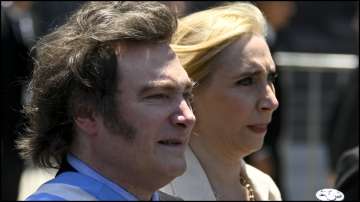'Not opportune': Argentina's President Javier Milei pulls out of plans to join BRICS
Milei said that the timing for Argentina's membership was inopportune and that his approach to foreign affairs "differs in many aspects from that of the previous government". This step fulfills Milei's campaign promise of pursuing closer relations with the West.

The newly-appointed Argentinian President Javier Milei has withdrawn his plans to join the BRICS (Brazil, Russia, India, China and South Africa) bloc of developing economies as he believed that the timing for the country's membership is not opportune, according to media reports. Milei told the BRICS leaders about his decision on December 22 but the letter was released on Friday.
Milei said that the timing for Argentina's membership was inopportune and that his approach to foreign affairs "differs in many aspects from that of the previous government. In this sense, some decisions made by the previous administration will be reviewed."
However, in his letter to the BRICS leaders, Milei said that Argentina would seek to "intensify bilateral ties" to increase "trade and investment flows" without joining the group.
The withdrawal is a step towards fulfilling Milei's campaign pledge to pursue closer ties with the West and move away from the efforts of the previous administration led by Alberto Fernandez to bolster relations with other developing economies. Argentina, the third-largest economy in Latin America, found its supporters in the BRICS in India, Brazil which is its largest trading partner, and China.
Argentina was among the six countries - along with Egypt, Ethiopia, Iran, Saudi Arabia and the United Arab Emirates (UAE), who were invited to join the BRICS during a high-level summit in Johannesburg, South Africa in August. These countries were to be formally admitted into the bloc from January 1 next year, with the exception of Argentina now.
Prime Minister Narendra Modi welcomed the bloc's decision to expand the bloc for other nations. He also congratulated countries for lending their faith and for applying the grouping. He urged member States to take advantage of India’s digital solutions and to work for the welfare of the Global South.
Milei's radical economic reforms
Domestically, Milei is facing substantial pushback from the country's powerful organised labour groups as he embarks on a programme of economic "shock therapy" and deregulation as Argentina reels from sky-high inflation. This came after the Argentina President signed a deregulation decree that included an end to limits on exports.
Thousands of people took to the streets of Buenos Aires to protest against the government's austerity plans, led by representatives for the unemployed who sought more support for poverty-stricken families and individuals. The Argentinian President had promised deep spending cuts in a bid to curtail the country's soaring inflation.
The approximately 300 changes would earmark many government companies for privatization, and loosen protections for renters, employees and shoppers. The steps also include a 50% devaluation of the Argentine peso, cuts to energy and transportation subsidies, and the closure of some government ministries.
According to Milei, the decree aims to return freedom and autonomy to individuals and "start dismantling the enormous amount of regulations" that have hindered the economic growth of Argentina. The reforms also include plans to privatise the state-owned companies.
Argentina also weakened its currency (peso) by over 50 per cent to 800 per dollar, cut energy subsidies, and canceled tenders of public works. The robust and the most difficult decision was taken in order to minimise economic shock and to fix the country's worst economic crisis in decades, with inflation reaching close to 150%.
In his election campaign, Milei called for several 'shock therapy' changes, including legalisation of the sale of human organs, slashing social spending, loosening regulations on gun control and cutting ties with China and Brazil. He also promised to abolish the central bank and introduce the US dollar in the Argentinian economy.
The IMF called the measures "bold" and said in a statement they would "help stabilize the economy and set the basis for more sustainable and private-sector led growth" following "serious policy setbacks" in recent months. "The situation is critical with 45% poverty and 200% annualised inflation," presidential spokesperson Manuel Adorni earlier told a press conference.
(with inputs from agencies)
ALSO READ | Argentina: Thousands protest outside Congress against President Milei's 'shock therapy' economic reforms